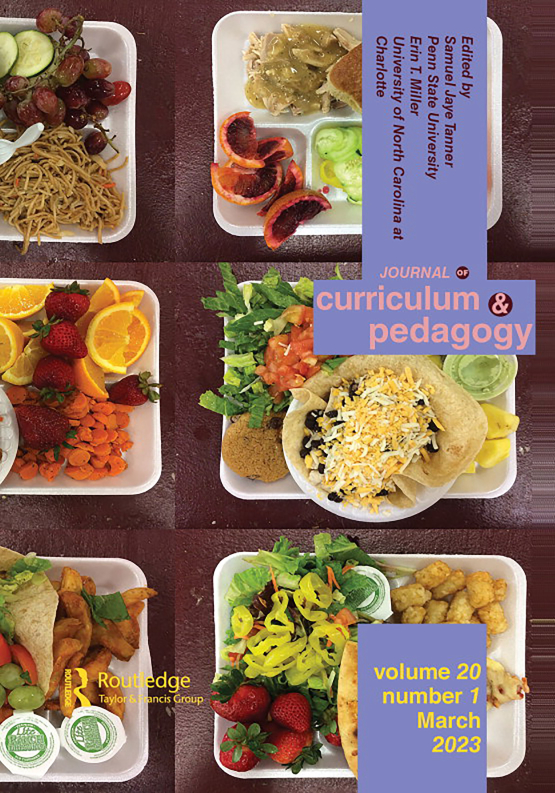Submit a Manuscript to the Journal
Journal of Curriculum and Pedagogy
For a Special Issue on
Educational Equity: Disrupting White Supremacy and Colonialism in Schools
Abstract deadline
16 October 2024
Manuscript deadline
30 April 2025

Special Issue Editor(s)
Jennifer M Bondy,
Arizona State University
[email protected]
Dyanis Conrad,
Randolph Macon College
[email protected]
Educational Equity: Disrupting White Supremacy and Colonialism in Schools
As the population of Students of Color in K-12 continues to grow, and as socio-political backlash against teaching about anti-oppression gains momentum, significant disparities in educational access, achievement, and opportunities persist. For instance, racially minoritized students continue to be seen as deficient, treated as criminals, positioned as perpetual foreigners, and lack access to culturally relevant, sustaining, and revitalizing curriculum and pedagogy (Au et al., 2016; Ladson-Billings, 1995; Lee et al., 2017; McCarty & Lee, 2014; Paris & Alim, 2017). Similarly, white students continue to be disciplined less, positioned as citizens, and achieve at higher levels (Au et al., 2016; Lee et al., 2017). However, acknowledging Students of Color through vague statements, celebrating their culture through additive approaches, or evading oppression altogether are insufficient to transform the education debt (Banks, 2016; LadsonBillings, 2006). Practitioners and educational researchers must examine how white supremacy operates – and is disrupted – in schools.
The purpose of this special issue is to examine, through critical perspectives, current research that highlights how Scholars of Color and their co-conspirators (Love, 2019) have supported the academic development of historically marginalized and excluded students. The ability to love and support Students of Color spirits, identities, and academic development requires that we consider how hegemonic norms perpetuated by ideologies of whiteness require disruptions (Lee et al, 2017; Love, 2019; Picower, 2021). Creating, nurturing, and sustaining healthy and trusting relationships with historically marginalized and excluded students has been salient to their educational progress, identity formations, and school belonging (Baines, Tisdale, & Long, 2018; Peguero & Bondy, 2011; Valenzuela, 1999). Therefore, we must also disrupt hegemonic norms in educational research questions, methodologies, and practices (Patel, 2015). This special issue seeks to foreground scholarly work that is accountable to the communities we serve.
Relevant manuscripts include, but are not limited to:
- Disruption of imperial, colonial, and white supremacist norms in teacher education and K-12 classrooms
- Research methodologies examining education as enacted by Scholars of Color and their co-conspirators (Love, 2019) that decenter settler colonialism, anti-Blackness, racist nativism, linguicism, Orientalism, trans* oppression, and gender binarism in schooling ideologies
- Transformative curriculum and pedagogy grounded in Black, Indigenous, Latinx, Asian, Queer of Color, and Immigrant resistance movements
- Exploration of pedagogies emanating from Students of Color positionalities, histories, assets, literacies, and communities of belonging
- Analyses of challenges and resistance that Students and Scholars of Color and their co-conspirators (Love, 2019) face in fostering educational equity and how they navigate such obstacles
Looking to Publish your Research?
Find out how to publish your research open access with Taylor & Francis Group.
Choose open accessSubmission Instructions
This special issue will feature various types of manuscripts. All manuscripts should contain a 150-word abstract and 3-6 key words.
Articles
- Empirical, theoretical, and methodological papers are welcomed. It is understood that each type of article submission will include elements that are equivalent to their genre of scholarly work.
- Should be no more than 6,500 words, inclusive of (if relevant):
- Abstract
- References
- Tables
- Figure or table captions
- Footnotes
- Endnotes
Creative or Speculative Approaches
- These shorter manuscripts are marked by a desire to conduct critical and creative research
- Submissions include, but are not limited to, poems, provocations, experimental exercises, and arts-based work
- Should be no more than 3,000 words, inclusive of references
Perspectives
- These manuscripts provide authors with the opportunity to share experiential knowledge and commitment, particularly in ways that speak to policy and practice.
- Should be no more than 1,000 words, inclusive of references
Expected Timeline
- Abstracts Due: October 16, 2024
- Invitations to Contributing Authors: November 06, 2024
- Articles Due: April 30, 2025
- Peer Review: May to October 2025
- Reviews Sent to Authors: October 16, 2025
- Revisions Due if Needed: December 30, 2025
- Publication Date: May 2026
Interested authors willing to commit to the above timeline should send a title, 300-word abstract, and a 100-word biographical note to [email protected] and [email protected] by October 16, 2024. We welcome proposals from both established scholars and early career researchers; interdisciplinary approaches are welcome. Invited manuscripts should be submitted to ScholarOne under the special issue "Educational Equity: Disrupting White Supremacy and Colonialism in Schools."
Please feel free to reach out to the co-editors with any questions.
Jennifer M. Bondy, Arizona State University ([email protected]); Dyanis Conrad, Randolph Macon College ([email protected])